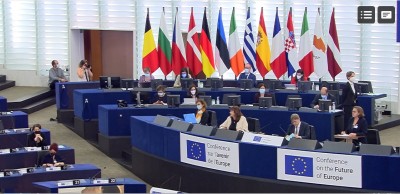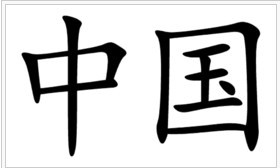 newsitems
newsitems  Eurofora's main Project Published at EU Conference on Europe's Future (on Day of 1st Plenary)
Eurofora's main Project Published at EU Conference on Europe's Future (on Day of 1st Plenary)
Eurofora's main Project Published at EU Conference on Europe's Future (on Day of 1st Plenary)

*Strasbourg/Angelo Marcopolo/- In view of the Forthcoming EU Reforms, a Brief but authoritative Summary of "Eurofora"'s main Project on EU Citizens - Politicians' Dialogue Before Decisions Affecting their Lives and/or Society at large, whose Ideas (Legal, Mediatic, Technological, Political, etc) were Prepared during a Long Period of Time, including a Series of Key Events, (1981/1997/2006/2018+), was Published Today Morning at EU's Conference on the Future of Europe's Official Website, which contains an UpDated List of European People's Ideas Presented in order to be Examined, Discussed and eventual Adopted, entirely or partly, in one form or another, by that Landmark 2021-2022 Mega-Conference (due to Highlight the most Important Reforms of the EU by European Heads of State/Government asap), that just Started Now in Strasbourg its 1st Plenary Session.
=> All Interested Readers Can, from now-on, Read, Comment, Endorse, and/or Follow relevant Developments on that "Eurofora"'s Project inside EU's Conference on Europe's Future Official Web Platform at the following link : https://futureu.europa.eu/processes/Democracy/f/6/proposals/32770
+ In Addition, Here we Publish also the Full, Original Version for such a Brief but Overall Presentation of that "Eurofora"s main Project in view of EU's Conference, (since the Version visible in EU's Platform is Even quite Shorter, for Technical Reasons of available Space, fixed by the Oganisers' technicians, there) :
_______________________________________________

Idea Proposed :
Dialogue EU Citizens - Politicians Before Decisions affecting their Life and/or Society
How to Overcome the apparent Contradiction between 92% of EU Citizens' Wish to be Taken into Account Before Final EU Decisions, and EU's Elected Representatives' will for a more Efficient Decision-Making ?
>>> By Establishing a (Judge-controled) Dialogue between EU Citizens and Politicians Before Decisions affecting their Lives and/or Society at large.
=> In this way, EU Citizens would have a Right to :
- Be Informed Before such EU Decisions might be taken.
- Be Heard (on their Objections, Proposals, etc), also Beforehand.
- Receive a Reply from the Competent EU Politicians Beforehand, which must be :
* Founded on a "Sufficient" Motivation, (Compared to the EU Citizens' Arguments).
* with "True" Facts, and
* with "Legal" Arguments,
* Pursuing an Aim of General Interest.
+ The chosen Measure must Not be Out of Proportion vis a vis its Legal Aim.
++ If, despite all these guarantees, that Measure proves, Afterwards, to be totaly InEfficient, vis a vis its Legal Aim, then, the Politicians who Decided that, can be Easily Exposed to the Public Opinion as UnTrustworthy or InCompetent, and, in Consequence, Loose the Next Elections.
------------------------------
The Legal Feasibility of such a System Can be Based on a Series of Relevant Legal elements, Most of which are Already Existing in almost all EU Member States, (as well as some elements of EU Lisbon Treaty).
This results mainly from an Original Legal Research of more than 1.000 Pages, (Chosen by the Faculty of Law of Strasbourg's University for a Prize awarded to PhD Thesis, on a written proposal by Professor Paul Amselek, of Paris II University), that we ha prepared and Succesfuly presented, receiving a "Très Bien" Mention.
Our Proposal was, Afterwards, presented to a 2-Days Long Collective Conference of many Citizens, organized by Strasbourg's EuroMetropole, Discussed and Endorsed by them, afterwards deposed Officialy in a Report to the French Government in Paris, in the Framework of "the Great Debate" organized by President Emmanuel Macron at the Spring of 2019.
Meanwhile, we have Presented and Discussed, at least the Substance of this Project, during a Long Period of almost 20 Years, with Many Top EU and/or CoE Politicians, Officers, Rapporteurs, etc., Including All EU Parliament's Presidents, (F.ex., concerning the Current President, David Sassoli, See : .... + ..., etc, as well as a relevant Paper on such Succesful EU/CoE Top Contacts).
We Firmly Believe that, if it's Properly Used and Developed, throughout Europe, such a System Could Help Bring the European People closer to their Political Representatives, considerably Strengthen Modern Democracy, and Stimulate a Wide Momentum for the Emergence of a Strong Europe in the World, at the foreseable Future.
***
(Draft-News)
------------------------------
Main Menu
Accueil Press Deontology/Ethics 2009 Innovation Year EU endorses EuroFora's idea Multi-Lingual FORUM Subscribers/Donors FAQs Le Elxis licence Recherche avancée EuroFora supports Seabird newsitems In Brief European Headquarters' MAPs CoE Journalists Protection PlatformBRIEF NEWS
- 00:00 - 02.06.2021
- 00:00 - 18.10.2020
- 00:00 - 19.06.2020
- 00:00 - 18.05.2020
- 00:00 - 20.04.2020
- 00:00 - 02.02.2020
- 00:00 - 09.12.2019
- 00:00 - 27.11.2019
- 00:00 - 16.11.2019
Popular
- Yes, we could have prevented Ferguson riots says World Democracy Forum's Young American NGO to ERFRA
- Spanish People Elect CenterRIGHT Majority with 1st Party and Total of 178 MPs (6 More than the Left)
- Pflimlin's vision
- The European Athletic "Dream Team", after Barcelona 2010 Sport Championship Results
- Source Conseil d'Europe à ERFRA: Debatre Liberté d'Opposants à Loi livrant Mariage+Enfants à Homos ?
- Head of BioEthics InterGroup, MEP Peter Liese : "Embryonic stem cell research reaching its END" !?
- Spain: Jailed Turkish Terror suspect with Explosive,Drones,Chechen accomplices stirs Merah+ Burgas ?
- UN Head Ban Ki Moon at CoE World Democracy Forum : - "Listen to the People !"
Latest News
- Test Photos (f.ex.+ Invit to EU + Korea Peace meeting)
- EUOmbudsmen Conference 2022: Digital Gaps affect People's Trust threaten EF Project on EU Future ?
- French Election : Black Out on Virus, but Obligation for Fake 'Vaccines" Challenged
- Both French Presidential Candidates point at "Humanism" in crucial times...
- France : Zemmour = Outsider may become Game Changer in Presidential + Parliamentary Elections 2022
Statistics
Visiteurrs: 60277987Archive
Login Form
Other Menu

EU-educated charming young Chinese presence started to be felt in Council of Europe's corridors in Strasbourg at the aftermath of an Historic Resolution adopted by its Parliamentary Assembly in favor of opening the possibility to give China a special "Status" in the PanEuropean Organization.
- "My proposal to offer to China an official status as "Observer", in short term, under conditions, was welcomed" by the CoE : "The road to Dialogue between China and the CoE has now been opened", declared after Strasbourg's debates and votes the Head of France's delegation, MEP Jean-Claude Mignon.

"Neither complacency, nor a mere condamnation of China", but a "wise approach of a political issue of great importance", advised Mignon to all those who'd either overload claims on Democracy, Human Rights or Minorities, or close their eyes to anything, there as elsewhere... A balance which was not exactly followed during debates, contrary to Mignon's personal stance, which appeared rather even-handed.
China is the only UNO Security Council permanent member which has not yet any status at the CoE, being still obliged to be represented in Strasbourg by a General Consul : USA and Canada, even Japan and .. Mexico, have already got a special Status at the CoE, following Strasbourg's decision, back in 1995, to counter-balance the accession of Russia (1996) by creating special links to traditional "Western-world" allies.

All former "Socialist" Eastern European countries started to have relations whith the CoE through its former sector on Culture and Education, before becoming full Members of Strasbourg's paneuropean organization. Speculations were unfolding recently about establishing a probable concrete link with China through the topical issue of anti-doping in Sport, on the occasion of the 2008 Olympic games.
More spectacular, a meeting co-organized a few years ago in Strasbourg, by EuroFora and the International Space University between EU Parliament's long-time Rapporteur for EU's Satellite Navigation system "GALILEO", German MEP Brigitte Langenhagen, and a group of postgraduate students, attracted special interest from Chinese experts, and was followed, in less than a month, by the anouncement of China's intention to support EU's GALILEO project with a participation of 200 million €.
Compared to that, revendications of .. "Turkish" Minorities, by Turkish MEPs, this week in Strasbourg, spreading through a wide area extended ...from Greece up to China, appeared less worrying, than pittoresque...
Meanwhile, France's political will to start involving China and other important countries in European and Global affairs was due to be raised also at the forthcoming G-8 Summit in Japan by President Nicolas SARKOZY, (NDLR : confirmed on July 5)


















